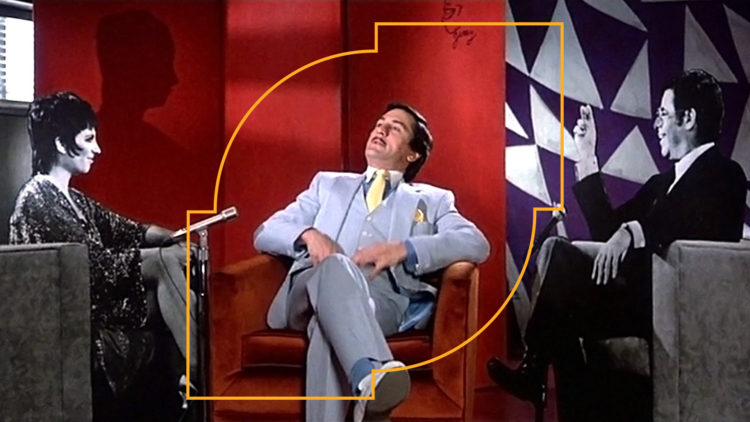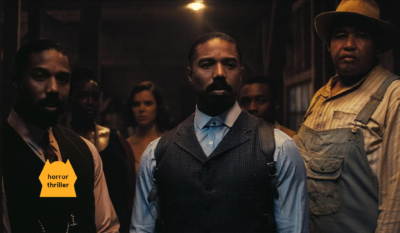In their fifth collaboration, Martin Scorsese and Robert De Niro explore the lengths one man will go to be given a chance in The King of Comedy


For a movie about a failed standup comedian, The King of Comedy difficult to watch. Rupert's delusions of success are funny at first but then grow cringe-worthy — and then dangerous. But there's a third act pivot that makes this one of my favorite Scorsese movies. It's so subtle but brilliant. It changes our perception of the characters and their motivations and makes us question who we were rooting for all along![]()



Chloé Zhao makes Nomadland‘s melancholic but hopeful story of nomads traversing the American West a stunningly complex character study of life on the margins of society.
![]()

Since Todd Phillips' forthcoming movie Joker has clear influences from Martin Scorsese's The King of Comedy — it even features Robert De Niro in a role similar to Jerry Lewis' in the movie — I'm taking a look back at the 1983 satirical black comedy.
I was ready to call Martin Scorsese's The King of Comedy a great and underrated entry in his filmography, but I wasn't ready to give it the masterpiece reevaluation that some critics have given it. Then, Jerry Langford (talk show legend Jerry Lewis playing a version of himself) stands in front of an electronics store with dozens of TVs tuned into Rupert Pupkin (Robert De Niro) performing a standup comedy set on Langford's show.
ADVERTISEMENT
We never see Langford's reaction to the set. We don't need to. In that one sequence, Scorsese is changing our perception of what we watched in the preceding 90 minutes. I think this is what a lot of people get wrong about The King of Comedy. To me, it isn't an indictment of celebrity or a cautionary tale about the tantalizing allure of fame. The way the ending is framed makes Pupkin an anti-hero — not dissimilar to Travis Bickle in Taxi Driver.
The brilliance of the movie comes from Scorsese's decision to make Pupkin the villain for most of the story. We're never truly on his side. We're really on no one's side, which is why it's an almost unpleasant experience to watch. Roger Ebert even said:
It is frustrating to watch, unpleasant to remember, and, in its own way, quite effective.
— Roger Ebert

💌 Sign up for our weekly email newsletter with movie recommendations available to stream.
ADVERTISEMENT
But then, after all the awkwardness and cringe-worthy antics from Pupkin, we see him perform. At that moment — and the one with Langford in front of the electronics store — I understood that this isn't a movie about celebrity or fame. It's a movie about talent going unrecognized and the struggle of being a creative or performer.
The obsession with celebrity and fame is explored with Sandra Bernhard‘s character of Masha, who is portrayed — a bit problematically — as someone with a mental illness, which drives her to stalk Langford. And her character looked at through the lens of the film, she's actually a foil to Pupkin. She has no reason to be in Langford's life other than a selfish one. Pupkin, on the other hand, has a reason and purpose, but still isn't afforded the same opportunity.
ADVERTISEMENT
Scorsese's longtime editor Thelma Schoonmaker does some clever work here stitching together Pupkin's delusional conversations and interviews with Langford, showing us both reality and what's in Pupkin's mind. And her masterful work doesn't stop there. Every scene feels important and intentional. Not a single second is wasted on anything else but the developments and information we need to see — a rarity, unfortunately.
While Scorsese is a director that often likes to show his work on screen, this is one of his few movies that is driven by its screenplay. He lets the story speak for itself and shows restraint, which we haven't seen from him in a while. It may never be the classic that Taxi Driver or Goodfellas is — this movie is slight in comparison — but The King of Comedy deserves a more respected place in the Scorsese canon.
ADVERTISEMENT
More movies, less problems
- Jordan Peele Unleashes the First Trailer for ‘HIM'
- ‘Sinners' is the best movie of the year | movie review
- Romantic sci-fi thriller ‘The Gorge' hits its mark | movie reivew
Hey! I'm Karl. You can find me on Twitter and Letterboxd. I'm also a Tomatometer-approved critic.
💌 Sign up for our weekly email newsletter with movie recommendations available to stream.
ADVERTISEMENT
💌 Sign up for our weekly email newsletter with movie recommendations available to stream.
ADVERTISEMENT
Hey, I'm Karl, founder and film critic at Smash Cut. I started Smash Cut in 2014 to share my love of movies and give a perspective I haven't yet seen represented. I'm also an editor at The New York Times, a Rotten Tomatoes-approved critic, and a member of the Online Film Critics Society.

